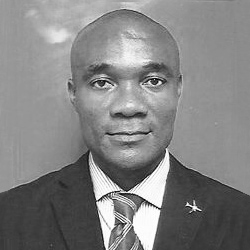Brain check...
Globally, there is a projected high demand and shortage of aviation professionals between 2024 and 2050 but flying schools in west africa are churning out professionals amidst fluctuating performance of the region’s airlines, most of which lack good economic health.

Graduation ceremony of pilots from International Aviation College, Ilorin, Nigeria
Picture: IAC, Ilorin
Since the late 90s, several aviation markets worldwide have been repeatedly reported to have a shortage of pilots and other aviation professionals. For west Africa, loss of jobs for professionals followed the collapse of national carriers that hitherto harboured many of them, who eventually retired.
However, with the advancements in technology that came with more airlines and more modern aircraft, poor airline management in west Africa alongside high cost of training, airlines in the Middle East, Europe, America and Asia have been gladly receiving willing west Africa’s young professionals, giving them irresistible job offers and welfare packages.
Nigeria, the leading country in west Africa currently has a deficit of over 200 air traffic controllers and the director general, civil aviation, Musa Nuhu says there is shortage of safety inspectors at the regulatory agency as well.
The challenges in Nigeria have further powered exit of many professionals from the country to work for airlines overseas. Some operators’ preference for expatriate pilots and engineers has not helped matters. Today, there are many professionals from Nigeria and Ghana who are working and prefer to work for various foreign companies across the world because of better welfare packages and conditions of service.
Meanwhile, aviation training institutions in west Africa produce professionals yearly. Perhaps, this is why some stakeholders posit that the region should take advantage of the global shortage of aviation professionals based on the availability of good training institutions, with a view to turning the global brain drain situation into economic gain for the sub-region.
“There is brain drain in the world and there is brain here in Nigeria. Nigeria has a lot of brains and there is inadequacy of pilots everywhere out there, Canada, the Middle East and so on. Rather than see the exit of trained professionals from Nigeria as a disadvantage, it can be turned into an advantage if you develop more capacity to train more and export them” suggests Emmanuel Chavez, president, airports council international (ACI), Africa.
“Since we are not producing things to export as a country and the rest of the world is looking for the professionals we are producing, we should focus on selling the brains and make it another export product”, said Hamisu Yadudu, former chief executive officer, Federal Airports Authority of Nigeria.
“It is not that we are draining them. We don’t have them enough. So, African governments need to invest more on aviation training capabilities for aviation professionals to be available in the continent,” said Esayas Woldemariam Hailu, director general, Asky.
Aaron Munetsi, president, Airlines Association of Southern Sfrica said: “For me, I think it is a blessing in disguise” and “the brain drain is actually a brain claim for us. Once we can claim that we have been able to train our own African workforce that is now competing globally and positioning themselves globally and being able to command some of the most highly skilled and desired jobs globally, in a way, I think it is a win-win.”
Stay up to date
Subscribe to the free Times Aerospace newsletter and receive the latest content every week. We'll never share your email address.


